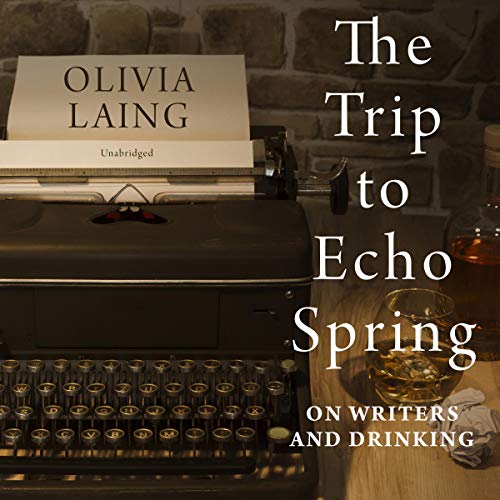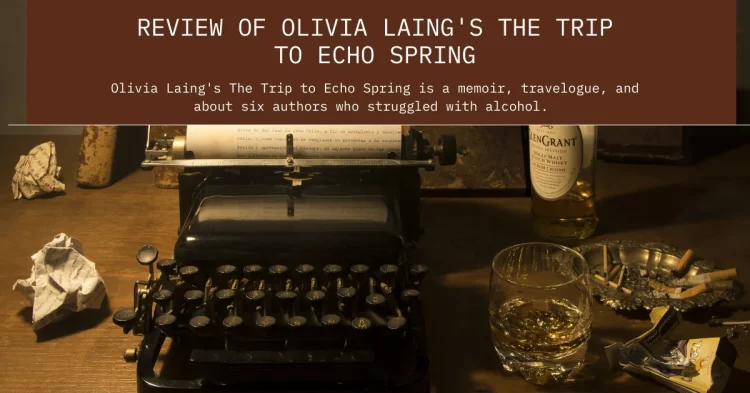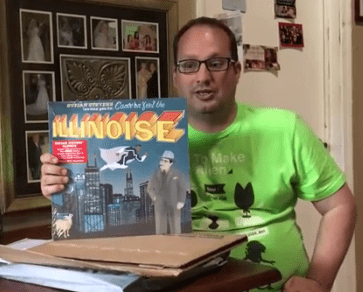How I Came Across Olivia Laing’s The Trip to Echo Spring
I have a peculiar relationship with audiobooks. Fiction audiobooks lose me, but nonfiction, especially about writers, holds my attention. This fascination led me to seek out a review of Olivia Laing’s The Trip to Echo Spring: On Writers and Drinking, a book that explores the connections between literary creativity and alcoholism.
Thanks to my local library’s Hoopla app, I experienced The Trip to Echo Spring as an audiobook. This isn’t an ad for Hoopla—I have a genuine appreciation for how it brings books like this into my life.
One of the reasons I sought out this book was Nick Cave. He wrote about Berryman and Hemingway in the same song, and that connection piqued my curiosity. While I was already somewhat familiar with Hemingway, it was through learning more about Nick Cave—his music, his inspirations, and his creative process—that I began to uncover the significance of John Berryman.
The more I learned about Berryman, the more I wanted to know, not just about his poetry but about the life that informed it. His poetry needs his life story to resonate fully; the pain, struggles, and raw humanity he poured into his work can only truly be understood in the context of his experiences. Cave’s ability to weave literary references into his music opened a door for me, showing how interconnected art forms are and how understanding the lives of these creators adds depth to their work.
It wasn’t just an academic interest—it felt personal, like a thread connecting writers, musicians, and readers across time. I needed to know more. So I made the trip to Echo Spring.

My Review of Olivia Laing’s The Trip to Echo Spring
Kate Reading’s narration deserves special mention in this review of Olivia Laing’s The Trip to Echo Spring. Her performance was outstanding; she so perfectly channeled Laing’s voice that at times, the two became indistinguishable in my mind. Unlike most audiobooks, which can feel like mere readings, this narration felt intimate, like someone recounting vivid, personal memories. The pacing, tone, and subtle inflections in Reading’s voice complemented the book’s themes beautifully, enhancing my connection to the text. It was as though she wasn’t simply reading but living the narrative alongside the listener.
So what do memories have to do with a book subtitled “On Writers and Drinking”? Laing’s work is a blend of biography, travelogue, and memoir—each strand weaving together to examine the lives of famous writers and their struggles with alcohol.
Her approach is not only deeply empathetic but also remarkably nuanced. She offers insights into the ways addiction intertwines with creativity. She doesn’t romanticize the pain these writers endured, nor does she shy away from the darker aspects of their lives.
The Biographies
I found the biographical sections to be the strongest. The writers she profiles—Tennessee Williams, John Cheever, Raymond Carver, F. Scott Fitzgerald, Ernest Hemingway, and John Berryman—were all deeply troubled men whose battles with addiction were only part of their struggles. These were men who lived complicated, often tragic lives, and Laing masterfully captures the humanity behind their genius.
Fitzgerald’s cruelty to Zelda, Cheever’s tormented identity, and Hemingway’s and Berryman’s suicides are explored with empathy but without excuses. Laing, an award-winning author in her own right, doesn’t shy from their dark side and never dips into hero worship. Her ability to balance admiration for their art with a clear-eyed view of their flaws is one of the book’s greatest strengths.
Laing is especially insightful with Cheever, noting the significance of his victory over alcohol, a point often underplayed elsewhere. Carver, perhaps the only true “success story,” is praised for the transformation sobriety brought to his writing. Laing’s careful storytelling ensures that even readers unfamiliar with these authors will come away with a deep appreciation of their work and struggles.
The highest compliment I can give is that she left me wanting to know more. Each writer’s story could easily fill an entire book on its own, and yet Laing manages to distill their essence into compelling, poignant narratives.
The Travelogue
The travelogue aspect is evocative, though for me, only New Orleans truly came alive; New York was close, but other locations faded in comparison.
That said, the descriptions of her travels add an atmospheric quality to the book, grounding the more abstract themes in real, tangible places. Laing’s writing here is vivid and cinematic, and while some locations felt less memorable, her narrative voice ensures that even these sections remain engaging.
The Memoir
My review of Olivia Laing’s The Trip to Echo Spring is a bit more critical in the memoir sections. While her candid reflections on her own experiences with alcohol are powerful, they can’t quite match the drama and darkness of her subjects’ lives. This isn’t to diminish Laing’s experiences, but rather to highlight the contrast between her measured self-reflection and the chaotic lives of the writers she examines.
Laing is a more self-aware and humane figure than the men she writes about; her demons are different, and, perhaps, more manageable. This contrast sometimes left me wishing for a deeper dive into the writers’ lives instead. However, her ability to weave her personal story into the broader narrative adds a layer of intimacy that many readers will appreciate. It’s a reminder that addiction and creativity are not issues confined to the past but remain relevant today.
Review of Olivia Laing’s The Trip to Echo Spring
Still, Laing’s prose is always engaging. Even when sharing personal details that felt less essential, her writing never loses its elegance or readability. Had the book been split into two—one a collective biography, the other a memoir—both would have made for required reading. As one, it’s still a fascinating and beautifully written exploration. Laing’s ability to connect disparate elements—literary history, personal reflection, and cultural critique—is a testament to her skill as a writer.
Olivia Laing’s The Trip to Echo Spring is more than a book about writers and drinking; it’s a moving meditation on creativity, addiction, and the costs of genius. I highly recommend it to anyone interested in literary lives or the tangled relationship between art and suffering. This book has stayed with me long after I finished it, and I suspect it will continue to resonate for years to come.
About The Author
Discover more from NolaNerdCouple.com
Subscribe to get the latest posts sent to your email.



